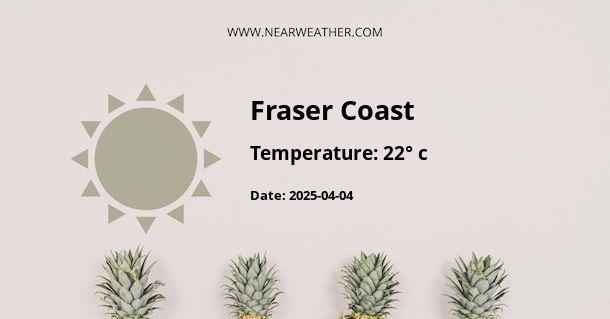Fraser Coast, Australia: Climate and Weather Overview
Welcome to the Fraser Coast, a region in Queensland, Australia known for its stunning coastline, diverse wildlife, and unique natural attractions. Understanding the climate and weather patterns of the Fraser Coast is essential for visitors and residents alike. From the sunny days at the beach to the occasional tropical storms, the weather in the Fraser Coast can vary significantly throughout the year. In this guide, we'll delve into the detailed insights on the climate and weather patterns of the Fraser Coast, providing you with a comprehensive understanding of what to expect throughout the year.
Annual Climate Overview
The Fraser Coast enjoys a mild and subtropical climate with plenty of sunshine throughout the year. The region experiences distinct seasons, each bringing its own unique weather patterns and outdoor opportunities.
Summer (December-February)
The summer season in the Fraser Coast is characterized by warm temperatures, high humidity, and occasional afternoon thunderstorms. Daytime temperatures typically range from 25°C to 30°C (77°F to 86°F), providing ideal conditions for beach activities and outdoor exploration.
While summer is generally considered the wet season, rainfall in the Fraser Coast is moderate compared to other regions in Queensland. The occasional tropical showers often bring relief from the heat and contribute to the lush greenery of the landscape.
Autumn (March-May)
Autumn brings milder temperatures and less humidity to the Fraser Coast, making it a popular time for outdoor adventures and nature walks. Daytime temperatures range between 20°C and 28°C (68°F to 82°F), creating comfortable conditions for exploring the region's natural beauty.
Rainfall decreases gradually throughout the autumn months, allowing for clear skies and pleasant outdoor activities. This season is ideal for exploring the diverse flora and fauna of the Fraser Coast, as the weather is generally mild and enjoyable.
Winter (June-August)
Winter in the Fraser Coast boasts mild and sunny days, with daytime temperatures ranging from 14°C to 23°C (57°F to 73°F). The region experiences minimal rainfall during winter, offering clear skies and perfect conditions for whale watching, beachcombing, and other outdoor pursuits.
Winter is also the peak season for whale watching in Hervey Bay, where visitors can witness the annual migration of humpback whales along the coast. The mild winter weather and calmer seas create an optimal environment for this unforgettable wildlife experience.
Spring (September-November)
Spring brings a gradual increase in temperatures and a vibrant display of blooming wildflowers across the Fraser Coast. Daytime temperatures range from 18°C to 27°C (64°F to 81°F), providing a pleasant climate for outdoor activities and sightseeing.
As the region transitions into spring, the wildlife becomes particularly active, making it an ideal time for birdwatching, bushwalks, and exploring the diverse ecosystems of the Fraser Coast. The moderate temperatures and lush landscape create picturesque settings for outdoor enthusiasts and nature lovers.
Extreme Weather and Natural Events
While the Fraser Coast enjoys a predominantly mild climate, it is important to be aware of potential extreme weather events and natural occurrences that can impact the region. The area may experience occasional tropical cyclones, especially during the summer months, which can bring heavy rainfall and strong winds.
Bushfires can also occur during periods of extended dry weather, particularly in the inland areas of the Fraser Coast. It is essential to stay informed about any fire bans and take necessary precautions when exploring the region during drier periods.
Climate Data for Fraser Coast
For a more in-depth understanding of the climate in the Fraser Coast, the following table provides a summary of the average monthly temperatures and rainfall levels throughout the year:
| Month | Average High (°C) | Average Low (°C) | Rainfall (mm) |
|---|---|---|---|
| January | 30 | 22 | 160 |
| February | 30 | 22 | 170 |
| March | 29 | 21 | 130 |
| April | 27 | 18 | 90 |
| May | 25 | 15 | 70 |
| June | 23 | 12 | 50 |
| July | 22 | 11 | 40 |
| August | 23 | 12 | 40 |
| September | 25 | 14 | 50 |
| October | 27 | 16 | 80 |
| November | 28 | 19 | 100 |
| December | 29 | 21 | 140 |
The climate data highlights the fluctuation of temperatures and rainfall levels across the different seasons, providing valuable insights for planning visits and outdoor activities in the Fraser Coast.
Conclusion
The Fraser Coast offers a diverse and inviting climate throughout the year, accommodating a wide range of outdoor adventures and nature-based experiences. From the warm summers ideal for beach outings to the mild winters perfect for whale watching, each season brings distinct opportunities for exploring the natural beauty of the region. By understanding the climate and weather patterns of the Fraser Coast, visitors can make the most of their experiences and immerse themselves in the captivating landscapes and wildlife that define this unique corner of Australia.
A - Fraser Coast's Latitude is -25.341450 & Longitude is 152.670242.
A - Weather in Fraser Coast is 22° today.
A - Climate Conditions in Fraser Coast shows light rain today.
A - Humidity in Fraser Coast is 93% today.
A - Wind speed in Fraser Coast is 11.34 km/h, flowing at 186° wind direction. today.
